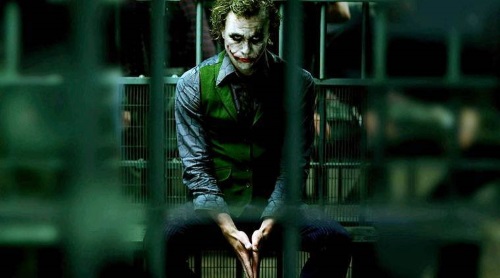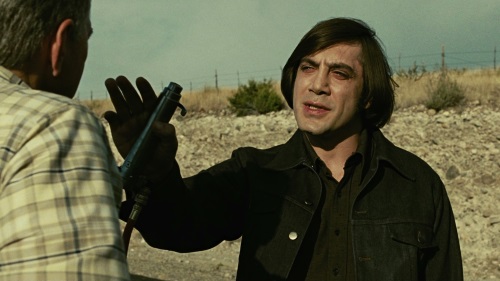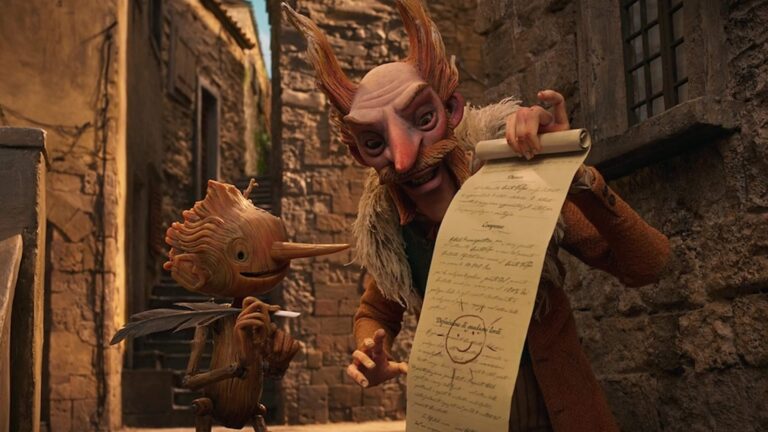Confessions of a Studio Script Reader Part II: Villain Backstories

Should villains be given a backstory to explain where they came from and why they are so evil? And does the script reader really care?
My name is listed below, and yes, I’m a former studio script reader. In our inaugural post Confessions of a Studio Script Reader, I broke the fourth wall and opened up to shed a little light onto the faceless silhouette of the studio script reader — the very person that holds your destiny in their hands.
In this second installment, I'm going to get a little more specific and confess my feelings about the common question of whether or not you, the screenwriter, should develop a backstory for your villains.
Note: Since I’m a former studio script reader, I’ll be confessing from the perspective of my past self in the present tense.
Confession #1 — "I don't care about a villain's backstory."
As a script reader and story analyst, my professional opinion about backstories for villains is, "I don't care."
I don't care if they have mommy or daddy issues. I don't care whether or not they were good little boys or girls at one time until X happened and then they literally (Darth Vader) or figuratively (Michael Corleone) turned to the dark side. I don't care.
I don't care why the Joker became so evil and obsessed with chaos.

I don't care why Chigurh is obsessed with flipping coins and how he became how evil he truly is.

I don't care why Hans Gruber became a leader of a terrorist group, exceptional thief, or whatever he preferred to be referred as.

Yes, there is a time and place for villain backstories — primarily in the superhero genre specific to the Marvel Cinematic Universe where the purpose of the backstory is to link that villain to the superhero and present them as an evil counterpart to what the hero represents. But too many screenwriting books and gurus throughout the last three decades have taken character development too far as a talking point.
Confession #2 — "So here's what I do care about when it comes to the villain..."
Character development doesn't have to extend to every major or supporting role. The hard truth that the books and the gurus won't talk about is that sometimes a major or supporting character is just there to serve a purpose within the story and the protagonist's journey.
And when it comes to the villain, the only two things I truly care about is that they are a badass force to be reckoned with and how the hero is going to beat this badass by becoming a force to be reckoned with in their own right. That's it. That's all a script needs. That's entertainment.
And if you want to add some details to flesh the villain out a little bit more, outstanding.
Case in point — Darth Vader.

So in the original Star Wars film — Star Wars Episode IV: A New Hope — Darth Vader was the bossman and evil henchmen rolled into one. When he was by Tarkin's side, he was the henchmen. But when he was on his own, he was bossman Darth Vader. And all that we knew about him beyond those details was that he was a pilot and Jedi Knight that became evil and killed Luke Skywalker's father.
https://youtu.be/pUaxXsqGeFI?t=1m35s
That's it. That's all we needed.
Now, in The Empire Strikes Back, we learn that this story was a lie — or from a "certain point of view" according to a dead Jedi Master — but we'll get to that shortly. It turns out, Darth Vader is Luke's father. A shocking surprise and outstanding twist. But remember that in the context of that sequel, this was just another detail that served the story and the hero's arc.
https://youtu.be/q6N1GBXx2FE
Return of the Jedi revealed a few more brief details. Obi-Wan Kenobi's Force Ghost tells Luke the truth. Anakin Skywalker — Luke Skywalker's father — was Obi-Wan's student. He turned to the Dark Side of the Force and became Darth Vader. Again, within the context of this now second sequel, this was just another detail added to the narrative. Nothing expansive.
And then — sigh — the Star Wars Prequels happened and we learned more backstory and more details that we just didn't need. If anything, one could argue that this extensive backstory that consisted of three feature films diluted the mystique of Darth Vader that we witnessed in the original trilogy of films.
All that we cared about in those original films when it came to that villain was that he was a badass force to be reckoned with. The additional broad stroke details were more than enough to expand that villain's character just a little bit more. But always remember that the added details were less about the backstory of a villain and more about adding conflict to the hero's journey.
Confession #3 — "There are only three things we need to know about most villains..."
1. What Are They?
2. What Do They Do?
3. What Are They Capable of?
That's it. If screenwriters show the answers to these three questions, they have all that they need to write a noteworthy villain. Granted, the answers have to be original, compelling, and engaging.
Are they supernatural, human, skill-driven, brilliant, or any other number of intriguing details?
What do they do that is so evil?
And finally, what does the story showcase that they are capable of?
Nine times out of ten, we don't need to know the hows and the whys of the answers to these questions. We just need to know what they are about. In the end, they are there to serve the hero's journey. They exist only to get in the way of what our hero or protagonist wants or needs.
Don't Believe Me?
Do you still think villains need major backstories? Do you think you need to spend ten pages or more on a villain origin story? Do you think you need multiple lines of bad exposition — or even worse, flashbacks — to explain away the villain's backstory with the hows and whys?
Here is a list of the 50 Greatest Villains of All Time, according to AFI.
- Dr. Hannibal Lecter, The Silence of the Lambs
- Norman Bates, Psycho
- Darth Vader, The Empire Strikes Back
- The Wicked Witch of the West, The Wizard of Oz
- Nurse Ratched, One Flew Over the Cuckoo's Nest
- Mr. Potter, It's a Wonderful Life
- Alex Forrest, Fatal Attraction
- Phyllis Dietrichson, Double Indemnity
- Regan MacNeil, The Exorcist
- The Queen, Snow White and the Seven Dwarfs
- Michael Corleone, The Godfather: Part II
- Alex De Large, A Clockwork Orange
- HAL 9000, 2001: A Space Odyssey
- The Alien, Alien
- Amon Goeth, Schindler's List
- Noah Cross, Chinatown
- Annie Wilkes, Misery
- The Shark, Jaws
- Captain Bligh, Mutiny on the Bounty
- Man, Bambi
- Mrs. John Iselin, The Manchurian Candidate
- Terminator, The Terminator
- Eve Harrington, All About Eve
- Gordon Gekko, Wall Street
- Jack Torrance, The Shining
- Cody Jarrett, White Heat
- Martians, The War of the Worlds
- Max Cady, Cape Fear
- Reverend Harry Powell, The Night of the Hunter
- Travis Bickle, Taxi Driver
- Mrs. Danvers, Rebecca
- Clyde Barrow and Bonnie Parker, Bonnie and Clyde
- Count Dracula, Dracula
- Dr. Szell, Marathon Man
- J. J. Hunsecker, Sweet Smell of Success
- Frank Booth, Blue Velvet
- Harry Lime, The Third Man
- Caesar Enrico Bandello, Little Caesar
- Cruella De Vil, One Hundred and One Dalmatians
- Freddy Krueger, A Nightmare on Elm Street
- Joan Crawford, Mommie Dearest
- Tom Powers, The Public Enemy
- Regina Giddens, The Little Foxes
- Baby Jane Hudson, Whatever Happened to Baby Jane
- The Joker, Batman
- Hans Gruber, Die Hard
- Tony Camonte, Scarface
- Roger “Verbal” Kint, The Usual Suspects
- Auric Goldfinger, Goldfinger
- Alonzo Harris, Training Day
With the exception of the antiheroes listed — Michael Corleone, Travis Bickle, Bonnie and Clyde, Tony Camonte, etc. — what backstories are we given for these outstanding villains beyond basic broad stroke lines of dialogue or visuals?
Some backstories may be more detailed than others, but what we know of these villains is simply through their actions, reactions, and the hopefully immense threat they pose against the hero or protagonist within the confines of the script or two-hour (give or take) feature film.
The Exceptions?
Television and streaming channel series are where you can develop those outstanding backstories for villains and antagonists. This format allows you to explore those characters over multiple episodes and seasons.
Look no further than The Handmaid's Tale villain Serena Joy Waterford (along with her husband's character backstory as well) as a perfect example of how you can further develop villains and their backstories in the series format.

The Marvel Cinematic Universe can be an exception as well, as many of the villains in the standalone hero installments are shadows of the heroes that often have intertwined origin stories.
And yes, antiheroes are a whole different beast where we see villains as protagonists.
Read ScreenCraft's How to Develop and Write Great Antiheroes!
I'm not against character development. I'm against unnecessary character development. And this also extends to all major and supporting characters. Character development and backstory are there for one single purpose — to serve the narrative of the story you are telling within the confines of that 90-120 page screenplay.
Everything else either belongs in a series or in a novel.
Until my next confession — keep grinding, keep writing.
Ken Miyamoto has worked in the film industry for nearly two decades, most notably as a studio liaison for Sony Studios and then as a script reader and story analyst for Sony Pictures.
He has many studio meetings under his belt as a produced screenwriter, meeting with the likes of Sony, Dreamworks, Universal, Disney, Warner Brothers, as well as many production and management companies. He has had a previous development deal with Lionsgate, as well as multiple writing assignments, including the produced miniseries Blackout, starring Anne Heche, Sean Patrick Flanery, Billy Zane, James Brolin, Haylie Duff, Brian Bloom, Eric La Salle, and Bruce Boxleitner. Follow Ken on Twitter @KenMovies
For all the latest ScreenCraft news and updates, follow us on Twitter, Facebook, and Instagram.
Tags
Get Our Screenwriting Newsletter!
Get weekly writing inspiration delivered to your inbox - including industry news, popular articles, and more!



























